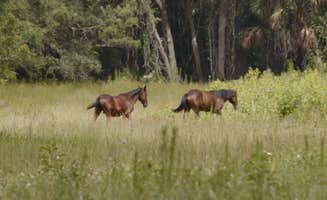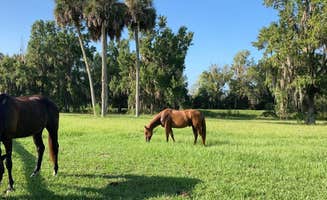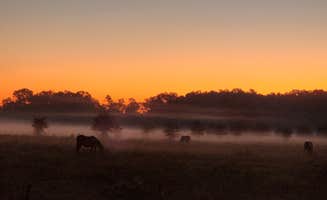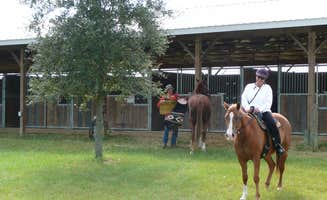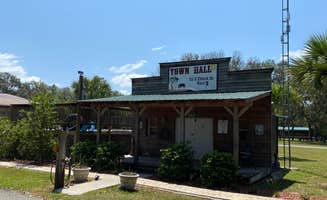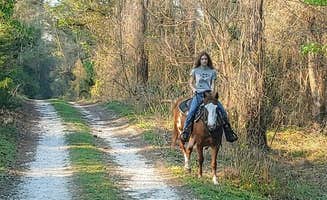Equestrian camping near Newberry, Florida offers riders access to the Cross Florida Greenway, a 110-mile linear park spanning from the Gulf of Mexico to the St. Johns River. The region sits at approximately 75 feet above sea level with predominantly sandy soil that drains quickly after rainfall. Winter temperatures average 45-70°F with minimal precipitation, making November through March the optimal season for horse camping in the area.
What to do
Trail riding at O'Leno State Park: Explore the 18-mile trail system where the Santa Fe River goes underground. "The park had nice hiking trails, but I enjoyed the kayaking most of all. There is a swimming section. The river goes underground but you can't kayak in this area," notes Sean B. who visited O'Leno State Park.
Observe wildlife at Paynes Prairie: Take your horse on designated equestrian trails to spot diverse wildlife in this unique ecosystem. "Many opportunities to spot wildlife close by. Buffalo, deer, eagles, alligators, owls....Visit Sweetwater," recommends Jenn B. about Paynes Prairie Preserve State Park.
Ride the Cross Florida Greenway: Access over 30 miles of multi-use trails suitable for riders of all experience levels. "Great for camping and horses. Amazing 2.3 mile hike that has a little bit of everything. Near Dunellon and Swampys Restaurant," shares Bryan about Ross Prairie Campground.
What campers like
Natural springs access: Cool off after riding at first-magnitude springs that maintain 72°F year-round. "The river has a small rapids area, for Florida. Got to see a snake sunbathing next to two turtles with kayaking," mentions Sean B. about O'Leno State Park.
Well-maintained equestrian facilities: Some campgrounds offer designated areas for horses. "Great place to kayak! You will be able to see a lot of manatees if you are lucky. The showers are large. The campsites are good and shaded," notes Jordan S. about Manatee Springs State Park.
Dark skies for stargazing: Minimal light pollution provides excellent night sky viewing opportunities. "Great location with plenty of dark skies. The spots are well spaced in the woods, with plenty of room," explains Joe R. about Paynes Prairie.
What you should know
Seasonal water levels affect trail access: Many equestrian trails become submerged during summer rainy season (June-September). "Hot with skeeters the majority of the year, cold overnight in the winter. All kinds of little critters in the woods and access to hikes and many gators," advises Dan X. about Paynes Prairie.
Limited cell coverage: Prepare for spotty or non-existent service at most horse camping areas. "Poor / spotty cell service in park, but there's free wifi at the concession stand. Concession stand was closed when we were there but there was still ok wifi that reached outside," reports Laura M. about Manatee Springs.
Required equestrian documentation: Most parks require current Coggins test documentation for all horses. "Gate access during closed hours for the public. Campground visitors get access code upon check in. Owners show you your site," explains Amanda A. about Ross Prairie Campground.
Tips for camping with families
Beginner-friendly horse trails: Several parks offer shorter, 1-2 mile loops suitable for younger riders. "We did the Ranger led hike which was really nice, my 5 year old struggled to keep up with the Ranger and there are decent elevation changes," shares Lindsey H. about Paynes Prairie.
Educational wildlife opportunities: Schedule ranger-led programs to learn about local ecosystems. "Lovely Park with lots of wildlife!! La Chua trail was beautiful and we saw lots of gators," adds Lindsey H.
Swimming areas for post-ride cooling: Select campgrounds with designated swimming zones. "This is a campground I have been to many times in the winter. It has water and electric hookups as well as a central playground and bathrooms," notes Christy C. about O'Leno State Park.
Tips from RVers
Specialized equestrian RV sites: Some campgrounds offer pull-through sites near horse paddocks. "Although in a populated area of Ocala, this campground is positioned in the trees and makes you feel like you are miles from civilization. The sites are spacious and most are shaded," describes Rich S. about Santos Trailhead & Campground.
Electrical requirements for horse camping: Most equestrian sites offer 30-50 amp service for RVs, but water access for horses varies by location. "Small near horse and bike trails, strict rules," notes Jennifer L. about Santos Trailhead.
Private ranch alternatives: When state parks are full, consider private horse camping facilities like Goethe Trailhead Ranch. "The stay here was amazing. We called the phone to reserve a spot and was told to pick a spot that was available. We picked a spot overlooking the back horse field and what an amazing view!" shares Rob V.


